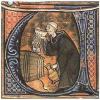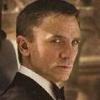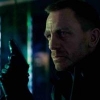I don't think QOS was a very good film.
1. There was no finished script when shooting started. That is very obvious as the parts Craig and Forster likely worked on seemed thrown in between the (too many) action sequences.
The plot was fine, but would have benefitted from a scene after the title sequence that set up the villains.
2. QOS was a direct sequel to CR. It relied too heavily on audiences remembering the events of a film the general public hadn't watched in nearly two years. The emotional resonance of the Bond/Vesper relationship was lacking because of this.
When Daniel Craig was interviewed about CR, he made a point of saying that the cast and crew set out to make a good film first and foremost which happened to be a Bond film. 'I didn't set out to answer my critics, I just set out to make a good movie.' <URL>
http://www.dailymail...yale.html</URL>
Craig and the producers kept going on about QOS being a direct sequel to CR, a new (and good in theory) idea for the Bond franchise. However, QOS doesn't work story-wise as a standalone film.
4. Marc Forster was a bad choice for the film. The producers wanted Roger Michell, but he was unable to direct due to scheduling constraints. I haven't seen any of Michell's films, so I don't know about his style of direction.
Forster did a good job on the non-action scenes, but since this was his first action film, he really should not have decided to experiment with the fast cutting/shaky cam style utilized in the Bourne franchise and the new Batman films.
The car chase was hard to follow because of the poor editing. Since QOS was supposed to be a direct sequel to CR, it should have kept the same stylistic qualities from CR. Before seeing QOS for the third time in theatres, I watched CR and the jarring difference in direction jumped out at me even more than it had in the first viewing.
The opera scene was excellent until the shootout. It had the feel of the 60s Bond films where Bond actually had to act like a spy and sneak around to do surveillance. The shootout being intercut with Tosca failed miserably. The idea was fine, but because Forster chose to use a modern performance of Tosca, with modern dress and handguns, it was hard to tell what was part of Bond's fight and what was part of the performance. A film buff friend I saw the film with commented during that scene, 'did Bond just shoot one of the chefs?'
5. QOS was marketed as a revenge film, but that element was barely in the film. There was the bit at the beginning where Bond swipes the photo of Vesper and Yusef, which was easy to forget about throughout the numerous action sequences, the scene on the plane with the photo, and the scene in Russia.
Because Yusef was actually who Bond was after, not Greene, Bond's interrogation of Greene should have been shown, rather than implied, and the rest of Bond's confrontation with Yusef should have been shown, so the audiences could see how Bond now handled these situations as opposed to how he handled them in CR (shot Mollaka and blew up the embassy).
A rule of thumb for writing is 'show, don't tell.' QOS 'told' more than it 'showed.' Seeing Greene crawling through the desert gasping and drinking the oil when Quantum's agents (and Mr. White perhaps?) show up and shoot him (ala Le Chiffre) would have been more effective and would have stopped people from thinking that after dropping off Camille, Bond drove back and forcefed Greene the oil and then shot him (which would have worked fine onscreen too).
6. QOS misused Bond allies.
Fields was an good character, but it seemed like the writers forgot about her character after she tripped Elvis at the party. Wouldn't Bond have remembered about her before leaving the party with Camille? Also, if Bond's mission was to get closure regarding Vesper, wouldn't he have waited until he had gotten closure to bed Fields?
I liked how Mathis' loyalty question was cleared up in QOS, but there was no need to kill off the character this early (if at all) in the reboot. The first problem with Mathis was in CR, when he was made an MI6 agent instead of a French intelligence agent. Just because the location of the card game changed didn't make that change necessary. He should have been left as Bond's European contact for future films. I suppose they could create a 'Mathis Jr.' character to take his place as they did in LALD with Quarrel Jr. because they filmed the novels out of order.
The portrayal of the CIA as corrupt and 'in bed' with Quantum made no sense in the context of the Bond franchise. It felt like a ripoff of the Bourne films where the CIA were the real villains and there was only one good person working there (Leiter/Pam Landy). Had this subplot been excised from the final film, there wouldn't have been much missing from the story. It felt like an attempt by Forster and Haggis to push their political views and anti-American sentiment on the audience. Bond is supposed to be escapism. In the novels Bond had a great admiration for the CIA and looked at America as an ally of Britain. His lines in the bar with Felix about the Americans having carved up South America were out of character (his line in the novels about sympathizing with the Cuban rebels against Batista made sense in the context. Since Batista was so evil, most people believed that Castro would be better, though he ended up being just as bad). It would have been better to keep Bond politically neutral.
M seemed to have been given alternate lines from CR to use in her scenes in QOS. It was all about whether she could trust Bond. That subplot appeared to have been solved at the end of CR when she and Bond spoke on the phone.
Tanner acted more like an aide/secretary to M, as opposed to a Chief of Staff. M had to explain things to him throughout, as if he was new on the job. In the novels, Tanner had been a field agent until he had received an injury. Villiers made sense in CR as M's personal aide when he appeared to become physically sick when he saw Solange's dead body. Tanner seemed to be just a different actor playing Villiers. I liked Villiers' character, but it appeared that the actor who portrayed Villiers was unavailable so they transferred his lines to a new character they arbitrarilly named Tanner.
7. Bond was played excellently by Craig, but was badly written.
At the end of CR, the audience is led to believe that 'James has become Bond.' Throughout the film he earns different aspects of the character ('OO' licence, Aston Martin DB5, gunbarrel, 'Bond, James Bond,' and of course the Bond theme). This caused audiences to think that Bond's character had evolved to the point of the previous films and was no longer growing into his skin.
But in QOS there was more developing for Bond's character, yet it seemed to be a rehash of what he learned in CR. In CR, he has to learn not to kill terrorists in embassies before he can question them, that quietly disposing Le Chiffre is not the answer because MI6 and CIA need information from him, that he cannot trust people as blindly he did Vesper, and he had to earn M's trust that he had his priorities straight (the phone call after Vesper's death appeared to confirm M's trust in Bond's judgment-'you've learned your lesson'). In QOS he has to learn not to kill Quantum's agents before he can question them ('Slate was a dead end'), to trust Leiter (didn't he already learn that when Leiter fronted him the $5 million? If he wasn't trustworthy, why help Bond out in that situation?), and to earn M's trust again (coming back to tell her about Fields after she had him taken away by MI6 agents). In the novel CR, Vesper's death cemented Bond's character and drive (to get at the people behind the spies), but in the films, Vesper's death seems to revert Bond back to his Madagascar/Miami mindset. That can't be though, because of his conversation with M after Vesper's death and the fact that he shot Mr. White in the leg with the intention of interrogating him.
Because Bond had become the Bond we all know and love at the end of CR, he should have acted that way moreso in QOS.
Had the filmmakers noticed the fact that Bond had 'earned' the gunbarrel during the bathroom fight in CR, they would have had the sense to put the gunbarrel at the beginning of the film.
8. There were too many action sequences: the car chase, the Palio chase, the hotel fight, the boat chase, the opera shootout, the plane chase, the elevator fight, the SWAT (was it SWAT or Bolivian police or CIA black ops?) chase, the hotel explosion/fight. Because there were so many fights and chases, few stand out as exceptional and the next Bond film will have a harder time finding unique action setpieces to use. Why not go back to the earlier Bond films, where there was suspense without a giant chase or shootout? The stalking from the beginning of FRWL, getting Koskov into the west in TLD, actual 'spy' stuff.
9. If it was so important for QOS to be a direct sequel to CR, the filmmakers should have given Martin Campbell however much money it would have taken for him to make a 'part deux' to his film CR.
Even non-Bond fan friends of mine have commented on the continuity of Bond's suit from CR to QOS. Bond's three-piece suit in CR was iconic, like the GF suit. That left a lasting impression on viewers. Though Tom Ford was the tailor for QOS (and Brioni for CR), there is no reason why Tom Ford couldn't have supplied Mr. Craig a three-piece navy suit with a blue shirt and blue tie (assuming the shirt and tie didn't come from another brand). Tom Ford wouldn't have had to make a duplicate of Brioni's suit (cut or color), they just would have had to add a waistcoat to give the casual viewer visual continuity. Bond could have taken the waistcoat off when he removed his tie during the interrogation scene.
The redeeming qualities of QOS are the music which was some of David Arnold's best, the acting from Craig, Dench, Arterton, Wright, and Jesper Christensen (Mr. White) was fantastic. I am sorry they were not given better material to work with.


 This topic is locked
This topic is locked



